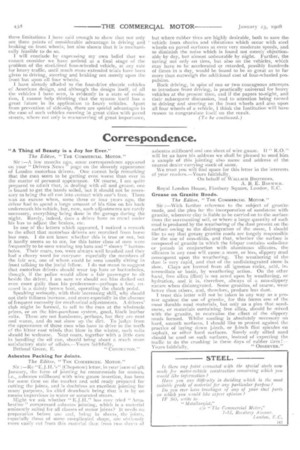Correspondence.
Page 14

If you've noticed an error in this article please click here to report it so we can fix it.
"A Thing of Beauty is a Joy for Ever."
The Editor, " THE COMMERCIAL MOTOR."
Sir :—A few months ago, some correspondence appeared on your " Drivers News " page on the slovenly appearance of London motorbus drivers. One cannot help remarking that the men seem to be getting even worse than ever in the matter of personal appearance. Of course, I am quite prepared to admit that, in dealing with oil and grease, one is bound to get the hands soiled, but it should not be necessary to bring the oil can into contact with one's face. There was an excuse when, some three or four years ago, the driver had to spend a large amount of his time on his back underneath his vehicle, but, now, such adjustments are rarely necessary, everything being done in the garage during the night. Rarely, indeed, does a driver have to crawl under his bus to adjust the brakes, etc.
In one of tha letters which appeared, I noticed a remark to the effect that motorbus drivers are recruited from horse bus men. I do not know whether this is true or not, but it hardly seems so to me, for this latter class of men were frequently to be seen wearing top hats and " showy " buttonholes. Their coats, .too, were always well brushed. and they had a cheery word for everyone especially the members of the fair sex, one of whom could be seen usually sitting in front talking to the jovial fellow. T do not mean to suggest that motorbus drivers should wear top hats or buttonholes, though, if the police would allow a fair passenger to sit beside the driver, I am sure we should see him decked out even more gaily than his predecessor—perhaps a foot, encased in a dainty brown boot, operating the clutch pedal.
Speaking seriously, with their increasing skill, why should not their tidiness increase, and more especially in the absence of frequent necessity for mechanical adjustments. A drivers' club might he formed, to sell to the men at the wholesale prices, or on the hire-purchase system, good, black leather suits. These are not handsome, perhaps, but they are neat and warm, and do not show up the dirt. To judge from the appearance of those men who have to drive in the teeth of the bitter east winds that blow in the winter, such suits should be welcome. Neat coats, together with a little care in handling the oil can, should bring about a much mono satisfactory state of afTairs.--Yours faithfully, Bethnal Green, E. CoxnucToR."
Asbestos Packing for Joints.
The Editor, " THE. COMMERCIAL MOTOR."
Sir :—Re "E. J.H.'s" (Chepstow) letter, in your issue of gth January, the form of jointing he recommends for motors, i.e., asbestos millb.oardwith wire gauze insertion, has been for some time on the market and sold ready prepared for cutting the joints, and is doubtless an excellent jointing for many purposes, its chief drawback being that it is by no means impervious to water or saturated steam.
Might we ask whether " B.J.H." has ever tried " Amabestine " compressed asbestos jointing, which is a material eminently suited for all classes of motor joints? It needs no preparation before use and, being, in sheets, the joints, especially those of some complicated shape, are obviously more easily cut from this material than from two slicers of
asbestos millboand and one sheet of wire gauze. If " R.O. will let us have his address we shall be pleased to send him a sample of this jointing also name and address of the nearest dealer carrying stock of same.
We trust you will find space for this letter in the interests. Of your readers.—Yours faithfully, On behalf of WALLACH BROTHERS, B. E. BARwICK.
Royal London House, Finsbury Square, London, E.C.
Grease an Granite Roads.
The Editor, "THE COMMERCIAL MOTOK."
Sit :—With further reference to the subject of granite. roads, and the plea for the incorporation of sandstone with granite wherever clay is liable to be carried on to the surface. from the surrounding soil, or where a large quantity of such mud is produced by the weathering of the dust present on the surface owing to the disintegration of the stone, I should like to say that greasy granite roads arc largely responsible for the use of non-skids, and that, Whether the surface is composed of granite in which the felspar contains soda-lime or potash in conjunction with aluminous silicates, the silicates in any case will cause a more, or less, slippery mud consequent upon the weathering. The weathering of the dust is very rapid and that of the undisintegrated stone is_ slow. Clays are 'formed from all igneous rocks, acid, intermediate or basic, by weathering action. On the other hand, free silica (flint) is not acted upon by weathering, or hydration, and it is, therefore, always of a non-slippery nature when disintegrated. Some granites, of course, wear better than others, and, therefore, produce less dust.
trust this letter will not he taken in any way as a protest against the use of granite, for this forms one of the most durable road materials, but only as a plea that sandstone, or materials containing free silica, should be mixed. with the granite, to neutralise the effect of the slippery muds formed. Whilst sanding is absolutely necessary on hard, smooth surfaces, I should like to protest against the practice of laying down ,1-inch, or i-inch flint spicules on asphalt, or other hard surfaces. Surely only sifted sand should be used on such surfaces, instead of expecting the traffic to do the crushing in these days of rubber tires !
Yours faithfully, " OBSERVER."


















